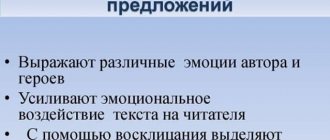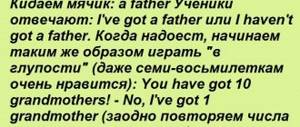Test on the topic “Isolated members of a sentence”
Separate members of the sentence
Memo
Separation
- highlighting the members of a sentence according to their meaning: in oral speech - with intonation, in writing - with commas, less often - with a dash.
Secondary members can be separated: definitions, applications, circumstances, additions, clarifying members of the sentence.
Application
- a type of definition that is expressed by a noun (with a dependent word) and answers the questions: which one? what exactly is it? who exactly is this?
Application is another name for an object and always refers to a noun. (Moscow, the capital of the ancient Russian state, was founded in 1147.)
Definitions and applications can be single (consisting of one word) and common (consisting of several words), consistent (standing in the same case with the word being defined) and inconsistent (standing in different cases with the word being defined).
Separating definitions and applications
| Separated (set off with a comma) | Not separated (not separated by commas) |
| 1. Common definitions expressed by participial phrases or adjectives with dependent words after the word being defined. (Roofs of houses were visible, sparkling in the sun. Near the houses grew bushes Common applications that appear after the word being defined (St. Petersburg, the capital of the Russian Empire, was founded in 1703.) | 1. Common definitions that appear before the word being defined and do not have a circumstantial meaning (Visible withsparkling in the sun roofs of houses. |
| 2. Any definitions and applications related to the personal pronoun, wherever they appear. ( And he, rebellious , asks for a storm... The ship, a three-masted sailing ship, moored to the shore. | 2. Single participles (St. were visibleflickering roofs.) |
| 3. Single homogeneous definitions, standing after the word being defined (March Night, dark, cold, oh wrapped us up. | 3. Participial phrases related to attributive, demonstrative, and indefinite pronouns. (Everything published in the newspaper was verified.) |
| 4. Common definitions, separated from the defined noun by other words. ( Forever alien to the shadows , the yellow Nile washes the hot steps. | |
| 5. Definitions and applications that appear before the word being defined and have a circumstantial (causal or concessional) meaning. ( Tired of the road, The travelers stopped for the night. (Why did they stop? They stopped because they were tired.) |
Isolation of applications (special cases)
| Separate themselves | Not isolated |
| 1. Common applications that appear after the word being defined (A fighter, a blond boy, quietly touches an accordion.) | 1. Single applications after common nouns are written with a hyphen (hero city). |
| 2. Any applications related to the personal pronoun. (Can he, a dwarf, compete with a giant?) | 2. Applications related to a proper name, but standing before the word being defined. ( Great Russian writer A.S. Pushkin was born on June 6, 1799 in Moscow.) |
| 3. Applications related to the proper name, coming after the word being defined. (A.S. Pushkin, great Russian poet, born June 6, 1799 in Moscow.)) | 3. Applications with the conjunction as in the meaning “as” (Everyone knows Ivanov as an experienced doctor.) |
| 4. Applications with the conjunction as in the meaning of causality (= since, = being) As a native of the south, This climate was not suitable for Valery. (Since Valery was a native of the south... Being a native of the south...) | |
| 5. Applications related to a proper name, standing before the word being defined, having a circumstantial (causal or concessional) meaning. ( Stubborn in everything Ilya Matveevich was stubborn in his studies as well.) |
Will remember
b: isolated applications can be highlighted with a dash if they are in the middle of a sentence and have an explanatory meaning (The caretaker of the shelter -
a retired soldier
- walked behind the owner.);
if the application is at the end of the sentence and words can be inserted before them,
namely
( In the far corner there was a spot of light - about
a light in the apartment window.)
Isolation of circumstances
| Separate themselves | Not isolated |
| 1. Single participles and participial phrases. ( Smiling , he greeted us. | 1. Adverbs silently, standing, sitting, reluctantly (Read lying down harmful.) |
| 2. Revolutions with prepositions despite, despite (Despite the storm , the ship went to sea.) | 2. Single gerunds at the end of a sentence (The birches stood motionless.) |
| 3. Phrases with the gerund being (As a student, he attended lectures regularly.) | 3. Phraseological phrases, which include gerunds (Work tirelessly . |
Remember
: if a single
conjunction And
connects homogeneous participial or gerund phrases (they must refer to the same word), then a comma is placed
before the conjunction And, after the conjunction And is not placed (
A girl
singing romances and accompanying herself on the piano,
performed on stage. The clouds were
quickly gathering and covering the sun
, they swept across the sky.)
If a single conjunction AND connects homogeneous predicates in a sentence in which there are participial or gerund phrases:
If the turnover comes after the conjunction I,
a comma is not placed before the conjunction AND
(The horses
stood and,
with their heads down, shuddered occasionally
.)
If the turnover comes before the conjunction AND , a comma is placed before the conjunction AND is placed (
The horses
stood
with their heads down
and
occasionally
.
)
If the phrases are not homogeneous (they refer to different words), commas are placed both before the conjunction AND and after the conjunction AND (
Savelich stood looking at Pugachev and, bowing to him, asked to have mercy on the young master.)
Separating add-ons
Separate themselves
additions with the meaning of exclusion or inclusion with prepositions except, except (Everyone
except the father
was in the room.)
Isolation of clarifying members of a sentence
Separate themselves
clarifying members of a sentence - more often than not, circumstances of place or time that specify the meaning of those emergency situations to which they relate and answer the questions: where exactly?
when exactly? (Here, in the village of Mikhailovskoye
, Pushkin was in exile.)
Test on the topic “Isolated members of a sentence”
I. Separation of definitions.
Write it down in your notebook, place punctuation marks for isolated definitions, underline the definitions, indicate the words being defined.
1) The frosty day, scattered with creaking snowdrifts, blinds the eyes. 2) The car circled for a long time through the streets that looked like gardens. 3) The deserted courtyard, cut by a ravine, was overgrown with weeds from end to end. 4) An ominous howl, piercing and loud, cut the sky. 5) An overgrown country road hugged the river. 6) Tired of the spring bliss, I fell into involuntary oblivion. 7) The road was white, illuminated by the moon. Experienced and careful Usoltsev weaned Andrei from neglecting details. (Usoltsev weaned why?) 9) Everything he wrote by hand has not survived.
2) The car circled for a long time through the streets that looked like gardens. 3) The deserted courtyard, cut by a ravine, was overgrown with weeds from end to end. 4) An ominous howl, piercing and loud, cut the sky. 5) An overgrown country road hugged the river. 6) Tired of the spring bliss, I fell into involuntary oblivion. 7) The road was white, illuminated by the moon. Experienced and careful Usoltsev weaned Andrei from neglecting details. (Usoltsev weaned why?) 9) Everything he wrote by hand has not survived.
II. Segregation of applications.
Write it down in your notebook, place punctuation marks for separate applications (commas or hyphens - there will be no mistakes), underline applications, indicate the words being defined.
1) Old man Zdanevich, a former gymnasium teacher, taught French to several teenagers. 2) The wonderful Russian poet Zabolotsky lived in the city of Tarusa shortly before his death. 3) My brother Petya, an eighth grade student, took part in a mathematics Olympiad. 4) The ship's doctor, a fast and strict old man, lived in our house. 5) Some kind of greenery, the creation of boring rains, covered the fields with a liquid net. 6) Nikolai Nikolaevich loved goldfinches most of all, colorful and elegant birds. 7) Ilyusha, like a playful boy, wants to redo everything himself. The response received is considered as consent.
2) The wonderful Russian poet Zabolotsky lived in the city of Tarusa shortly before his death. 3) My brother Petya, an eighth grade student, took part in a mathematics Olympiad. 4) The ship's doctor, a fast and strict old man, lived in our house. 5) Some kind of greenery, the creation of boring rains, covered the fields with a liquid net. 6) Nikolai Nikolaevich loved goldfinches most of all, colorful and elegant birds. 7) Ilyusha, like a playful boy, wants to redo everything himself. The response received is considered as consent.
III. Isolation of circumstances and additions.
Write it down in your notebook, place punctuation marks for isolated circumstances and additions, underline circumstances and additions.
1) Having discussed all the issues, he rose from the bench and hurried to the gate. 2) When leaving, father did not forget to close the door behind him. 3) The grandfather silently listened to the mother and left the room. 4) Despite the bad weather, the children went outside. 5) Being a diligent boy, Alyosha quickly learned to read under the guidance of his grandfather. 6) Grandma was returning home from church slowly. 7) I’m rushing to you at breakneck speed. Everyone except Gypsy was in the dyeing workshop. 9) With the exception of Aunt Natalya, the entire “stupid tribe” gathered in the kitchen.
2) When leaving, father did not forget to close the door behind him. 3) The grandfather silently listened to the mother and left the room. 4) Despite the bad weather, the children went outside. 5) Being a diligent boy, Alyosha quickly learned to read under the guidance of his grandfather. 6) Grandma was returning home from church slowly. 7) I’m rushing to you at breakneck speed. Everyone except Gypsy was in the dyeing workshop. 9) With the exception of Aunt Natalya, the entire “stupid tribe” gathered in the kitchen.
I V. Punctuation for participial and participial phrases before a single
conjunction and.
1)
The steamer hummed and, slapping its wheels, dragged along the loaded barges. 2) The rain dripped, refreshing the hot air and soon washed the dusty ground. 3) Heavy clouds rushed around all day, covering the sun and darkening the sky. 4) Trees blooming profusely and fragrant with spring aromas attract bees and bumblebees. 5) Vladimir squeezed forward, pushing the coachman aside and, going upstairs, looked around the estate.
V. Isolation of clarifying members of the sentence.
Write it down in your notebook, place punctuation marks on isolated clarifying parts of the sentence, and underline them.
1) In Boldino, in the center of the estate, there is a manor house where Pushkin stayed. 2) In the morning at exactly eight o’clock the museum opens - the estate of A.S. Pushkin. 3) It was here in Mikhailovsky that Pushkin spent two years in exile. 4) Near Mikhailovsky, near the walls of the Svyatogorsk Monastery, A.S. was buried. Pushkin.
Download material
so UNT / Lesson plans for the Russian language / Lesson plans for the Russian language 8th grade
Lessons No. 87-88. SUMMARY LESSON-TEST ON THE TOPIC “SEPARATE MEMBERS OF A SENTENCE”
04.11.2011 27760 2419
Lessons No. 87-88. SUMMARY LESSON-TEST ON THE TOPIC “SEPARATE MEMBERS OF A SENTENCE”
Target:
testing the knowledge, skills and abilities of students. The whole class is divided into three groups.
I. Checking the assimilation of the conditions for isolating minor members of a sentence.
The following sentences are written on the board:
1.
The writer uses generally accepted words, but, a master of his craft, he knows how to place a word among others so that it sounds unexpected, weighty, new.
2.
A. Green created a world of happiness, flight, rapture, thoughtfulness and much more, always bright and deep, always unusually noble, winged.
3.
Generation after generation was brought up on Andersen’s fairy tales, rejoicing, indignant, sympathizing.
4.
The books of Antoine de Saint-Exupery, poet, thinker and pilot, were written with immense love for life, with a sense of great responsibility to people.
5.
A demanding artist, Krylov worked painstakingly on every line.
6.
N.V. Gogol, an inspired master of the poetic word, created works that captivate the reader with the truthfulness of his images.
Representatives of 3 groups (one student each), using sentences written on the board, give a monological, coherent answer about the conditions for the isolation of secondary members. Students from other groups act as opponents, review and evaluate their work.
II. Graphic dictation.
Completed by all students on pieces of paper. The work can be checked immediately by teaching assistants.
1.
Work, the best cure for many ailments, makes a person healthy, strong and beautiful.
2.
Glory gained in battle and earned through labor does not fade, does not rust, and is not forgotten.
3.
The people, despite the difficult life, strived for beauty, poured an excess of creative energy into weaving lace, embroidery, and coloring a salt shaker, ladle or dish.
4.
In the dark distance there was nothing but sparkling lights.
5.
The sound of the sea coming from below spoke of peace.
6.
He quickly looked around and, blinking timidly, jumped up from the ground.
III. Punctuation skill test.
Group I
Exercise:
insert missing punctuation marks and explain them graphically.
Pilot A. Meresyev fell into the “pincers”. Having shot all the ammunition, virtually unarmed, he was surrounded by four German planes and, without allowing him to turn around or deviate from the course, they took him to their airfield.
Four Messerschmitts, leaving the battle, surrounded Alexei from the sides, pinched him from above and below, dictating his path with bullet tracks clearly visible in the blue and transparent air. When the forest jumped on him like an animal, Meresyev turned on the ignition. The falling plane hit the tops of pine trees. Having broken several trees, the car fell into pieces, but a moment before Alexei was torn out of his seat and thrown into the air and, falling on a broad-shouldered, century-old branch of a spruce tree, he slid along the branches into a deep snowdrift swept by the wind at the foot.
According to B. Polevoy
Group II
Exercise
the same (see first group).
On January 24, at 4:30 in the afternoon, two sleighs stopped almost simultaneously at the Commandant’s dacha located on the Black River. Danzas, Pushkin's second, and d'Archirac, Dantes' second, set off to look for a convenient place found about a hundred and fifty meters from the dacha.
The large and dense bushes surrounding the site could hide from the eyes of cabbies left on the road what was happening here. Having chosen this place, the seconds trampled the snow with their feet in the space needed for the fight and called the opponents.
Danzas, waving his hat, gave the signal and the opponents began to converge. Ill group
A deep ravine with a spring stream is protected from the sun by shady elms. A steep and wide path, washed out by a tractor, runs along the ravine to the river. The ravine rushes out onto the sandy shore, the creaking elms stop abruptly, leaning back, but they cannot hold the stream - like a crystal stream it pours into the river, collecting playful fish on the sandbank, harmlessly small and good for nothing.
And the fast, bright river with a sandy bottom and warm water runs unevenly, meandering around the main attraction of the village - the old
guy.
Judging by the trees (veterans), they planted it a hundred years ago
According to I. Shevtsov
IV. Testing the ability to see the role of isolated members of a sentence in literary texts.
Students read texts selected at home, pointing out the role of isolated minor members in speech. (The work can be done individually or by group representatives.)
V. Test “Punctuation in a simple sentence.” Exercise:
find matches (letters to numbers), place punctuation marks.
Option I
/. In all these people, despite their external differences, Samghin felt something united.
2.
The father, black with dust and with bloodshot eyes, arrived only in the evening.
3.
There was always a lot of duckweed floating on a small lake called Larin’s Pond.
4.
Russian writers, with the exception of the omniscient Pushkin, did not pay attention to folklore.
5.
Attracted by the light, the butterflies flew in and circled around the lantern.
6.
To you, my comrade, I give my angular tenderness to the poem
(A. Surkov).
7. We will work with our sleeves rolled up.
A is a sentence with a separate definition, standing after the noun being defined.
B - the sentence is complicated by an introductory construction. B is a sentence with a separate circumstance. G is a sentence with a separate object. D - sentence with appeal.
E is a simple uncomplicated sentence.
F is a sentence with a separate definition that has additional causal meaning.
As a result, students must produce the following entry: IB; 2A; ZB; 4G; 5F; 6D; 7E.
Option II
/. In addition to vivid artistic sketches, V.K. Arsenyev’s books also contain a lot of valuable material about life in the Ussuri region.
2.
The sun, hiding behind a narrow bluish cloud, gilds its edges.
3.
The poor guest, with his shirt torn and scratched until he bled, soon found a safe corner
(A.S. Pushkin).
4.
I saw you hills and fields
(A.S. Pushkin).
5.
Tired from the day's march, Semenov soon fell asleep
(V. Korolenko).
6.
He extended his hand to me, I couldn’t help but give him mine and walked out with slow steps.
7.
The boy ran headlong.
The letter designations are the same as in version I. The result is: 1 G; 2B; BEHIND; 4D; 5F; 6B; 7E.
VI. Creative work.
Make up a few sentences for one of the photographic sketches (“April”, “Forest Stream”, “Sunset over the Sea”).
VII. In conclusion, representatives of the three groups answer
to
the question:
What do the isolated members have in common and how do they differ? VIII. Homework:
prepare for the test dictation.
See the downloadable file for the full text of the material.
The page contains only a fragment of the material.





